
The Kingdom of Travancore (/ˈtrævənkɔːr/), also known as the Kingdom of Thiruvithamkoor, was an Indian kingdom from c. 1729 until 1949. It was ruled by the Travancore Royal Family from Padmanabhapuram, and later Thiruvananthapuram. At its zenith, the kingdom covered most of the south of modern-day Kerala, and the southernmost part of modern-day Tamil Nadu with the Thachudaya Kaimal's enclave of Irinjalakuda Koodalmanikyam temple in the neighbouring Kingdom of Cochin. However Tangasseri area of Kollam city and Anchuthengu near Attingal in Thiruvananthapuram district, were British colonies and were part of the Malabar District until 30 June 1927, and Tirunelveli district from 1 July 1927 onwards. Travancore merged with the erstwhile princely state of Cochin to form Travancore-Cochin in 1950. The five Tamil-majority Taluks of Vilavancode, Kalkulam, Thovalai, Agastheeswaram, and Sengottai were transferred from Travancore-Cochin to Madras State in 1956. The Malayalam-speaking regions of Travancore-Cochin merged with the Malabar District and the Kasaragod taluk of the South Canara district in Madras State to form the modern Malayalam-state of Kerala on 1 November 1956, according to the States Reorganisation Act, 1956 passed by the Government of India.

Elamkulam Manakkal Sankaran Namboodiripad, popularly known as EMS, was an Indian communist politician and theorist, who served as the first Chief Minister of Kerala in 1957–1959 and then again in 1967–1969. As a member of the Communist Party of India (CPI), he became the first non-Congress Chief Minister in the Indian republic. In 1964, he led a faction of the CPI that broke away to form the Communist Party of India (Marxist).
Malayalam journalism encompasses journalism published and broadcast in the Malayalam language. Modern Malayalam journalism can be traced to the publication of the Raajyasamaachaaram and the Pashchimodhayam under the direction of Hermann Gundert in June 1847. Kerala has the highest media exposure in India with newspapers publishing in nine languages, mainly English and Malayalam.
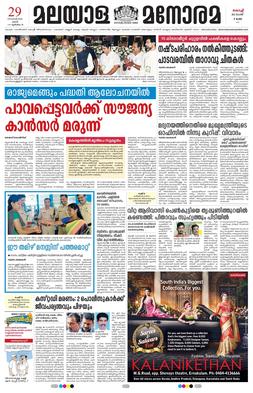
Malayala Manorama is a morning newspaper in Malayalam published from Kottayam, Kerala, India by the Malayala Manorama Company Limited. Currently headed by Mammen Mathew; it was first published as a weekly on 22 March 1888, and currently has a readership of over 20 million. It is also the second oldest Malayalam newspaper in Kerala in circulation, after Deepika, which is also published from Kottayam. Manorama also publishes an online edition.

Govindan Parameswaran Pillai, also known as Barrister G. P. Pillai, was a freedom fighter, social reformer, barrister, journalist, and publisher. He established the first English language newspaper in South India, The Madras Standard. He drafted the Malayali Memorial in 1891. Pillai is the only Malayali whom Mahatma Gandhi has mentioned in his autobiography. He regularly wrote columns in various newspapers. Pillai stood against autocratic governance in Travancore and promoted civil rights and equal opportunity among all classes.
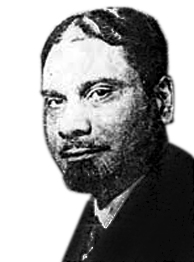
Chempakaraman Pillai was an Indian-born political activist and revolutionary. Born in Thiruvananthapuram, to Tamil Pillai parents, he left for Europe as a youth, where he spent the rest of his active life as an Indian nationalist and revolutionary.

Sukumari Amma was an Indian actress best known for her works in Malayalam and Tamil films. In a career spanning more than five decades, She has appeared in more than 2500 films predominantly in Malayalam, Tamil, Telugu, along with few Hindi and one each in Sinhala, French, Bengali, Tulu, English and Kannada films. Sukumari began acting at the age of 10. In 2003, she was awarded the Padma Shri by the Government of India for her contributions toward the arts. She won the National Film Award for Best Supporting Actress for her role in the Tamil film Namma Gramam (2010). Sukumari died on 26 March 2013 in Chennai, following a heart attack.
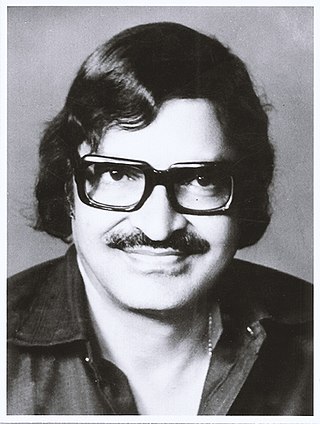
P. K. Manthri was an Indian cartoonist.
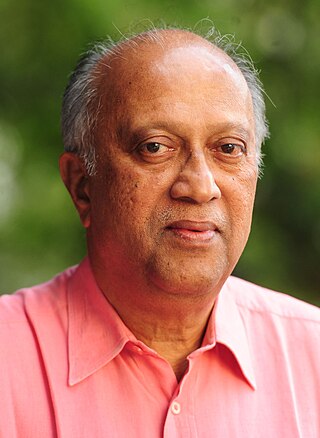
Thomas Jacob is an Indian former journalist who was the editorial director of Malayala Manorama.
Karimpumannil Mathai George (1914–2002), popularly known as Dr. K. M. George, was an eminent Malayalam writer and educator. An erudite scholar and literary critic with astute organisational capabilities, he is best known as a pioneer of Comparative Indian Studies and Literatures. He was a recipient of the fourth highest Indian civilian honour, the Padma Shri, the highest literary award of the Government of Kerala, the Ezhuthachan Puraskaram and the third highest Indian civilian award, the Padma Bhushan, besides other honours.
Karoor Neelakanta Pillai was an Indian writer of Malayalam literature and one of the founders of Sahithya Pravarthaka Co-operative Society. Some of his works such as Poovan Pazham and Marappavakal are counted by many among the best short stories in Malayalam. He was a recipient of the Kerala Sahitya Akademi Award for Children's Literature in 1960, which he received for his work Anakkaran, and the Kerala Sahitya Akademi Award for Story in 1969, which he received for his short story Mothiram.
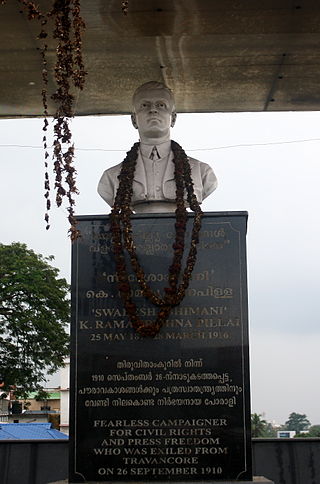
K. Ramakrishna Pillai (1878–1916) was an Indian nationalist writer, journalist, editor, and political activist. He edited Swadeshabhimani, the newspaper which became a potent weapon against the rule of the British and the erstwhile princely state of Travancore and a tool for social transformation. His criticism of the Diwan of Travancore, P. Rajagopalachari and the Maharajah led to the eventual confiscation of the newspaper. Ramakrishna Pillai was arrested and exiled from Travancore in 1910. Vrithantha Pathra Pravarthanam (1912) and Karl Marx (1912) are among his most noted works in Malayalam, Vrithantha Pathra pravarthanam being the first book on journalism in Malayalam and Karl Marx, the first ever biography of Karl Marx in any Indian language. But it has been alleged that he plagiarized the biography from an essay, Karl Marx:A Modern Rishi, by Lala Hardayal, published in 1912 March issue of the Modern Review, published from Kolkata.

Sooranad P. N. Kunjan Pillai was an Indian researcher, lexicographer, poet, essayist, literary critic, orator, grammarian, educationist, and scholar of the Malayalam language, best remembered for his contributions in compiling Malayala Maha Nighantu, a lexicon. The Government of India awarded him the fourth highest civilian honour of the Padmashri in 1984 for his contribution to Malayalam literature and education. He was also a recipient of the Vallathol Award in 1992 and when the Government of Kerala instituted the Ezhuthachan Puraskaram, their highest literary honour in 1993, he received the inaugural award.

Government Law College, Thiruvananthapuram also known as GLC Trivandrum is one of the institutions imparting graduate and post graduate legal education in India. Affiliated to the University of Kerala, it is the second law college in Kerala and one of the oldest law colleges in India. It was established in 1875 by the then Maharajah of the erstwhile Princely State of Travancore. Notable alumni of the college including Judges of Supreme Court of India such as Justice Fathima Beevi, judges of High Courts, politicians, and academicians such as N. R. Madhava Menon.

Pothan Joseph (1892–1972) was a journalist in 20th-century India whose career spanned the twenty years before and twenty years after India's independence. He worked with notable people of the time such as Muhammad Ali Jinnah, Annie Besant, Mahatma Gandhi, Sarojini Naidu, and Motilal Nehru. He was the first to write a daily political column for five decades, called 'Over A Cup of Tea', sprinkled with Biblical and Dickensian quotes. He also discovered and nurtured the Indian cartoonist Shankar, helping to make political cartoons a staple of newspapers.
Keralapress is a Malayalam language News agency established in the year 1930 by veteran journalist C.G.Kesavan from Madras, from where he was working with The Hindu at the time.

Gopala Pillai Sankara Pillai, better known as G. Sankara Pillai, was an Indian playwright, literary critic, and director, known to be one of the pioneers of modern Malayalam theatre. A proponent of total theater, he was the founder of Nataka Kalari movement in Kerala and the chairman of the Kerala Sangeeta Nataka Akademi. He was a recipient of a number of awards including the Kerala Sahitya Akademi Award for Drama in 1964 for the work Rail Palangal and the Sangeet Natak Akademi Award for the best playwright in 1979.
Kandathil Mammen Cherian was an Indian media person and former chief-editor of Malayala Manorama, the Malayalam daily, ranked the first in Malayalam, the fourth in India. and the eleventh in the World, in terms of circulation. He is a recipient of Padma Bhushan and Padma Shri, the third and fourth-highest Indian civilian awards.

K. Kumar (1894–1973) was an Indian orator, reformer and writer of the Indian pre-independence era. He was one of the earliest socio-political leaders to have brought Gandhi's message and the spirit of the national movement to the erstwhile Travancore State. A gifted translator, he traveled with Gandhi during his Kerala tours, interpreting his English speeches in Malayalam. He was also an Advisor to the Nehru government. Kumarji was the President of the Travancore Congress Committee and was also in charge of Gandhiji's Travancore tour more than once. He served on the AICC and on the working committee of the AICC, TC-PCC/ KPCC heading its Constructive Work Committee during crucial years of the freedom movement. He also functioned as the Chairman of the Parliamentary Committee of Travancore














